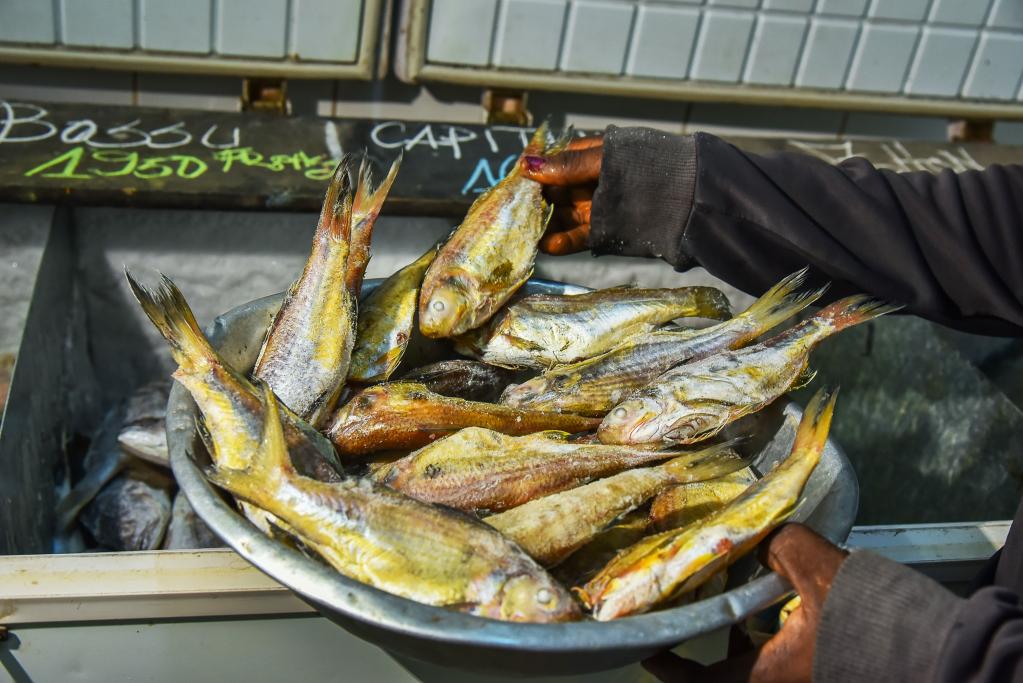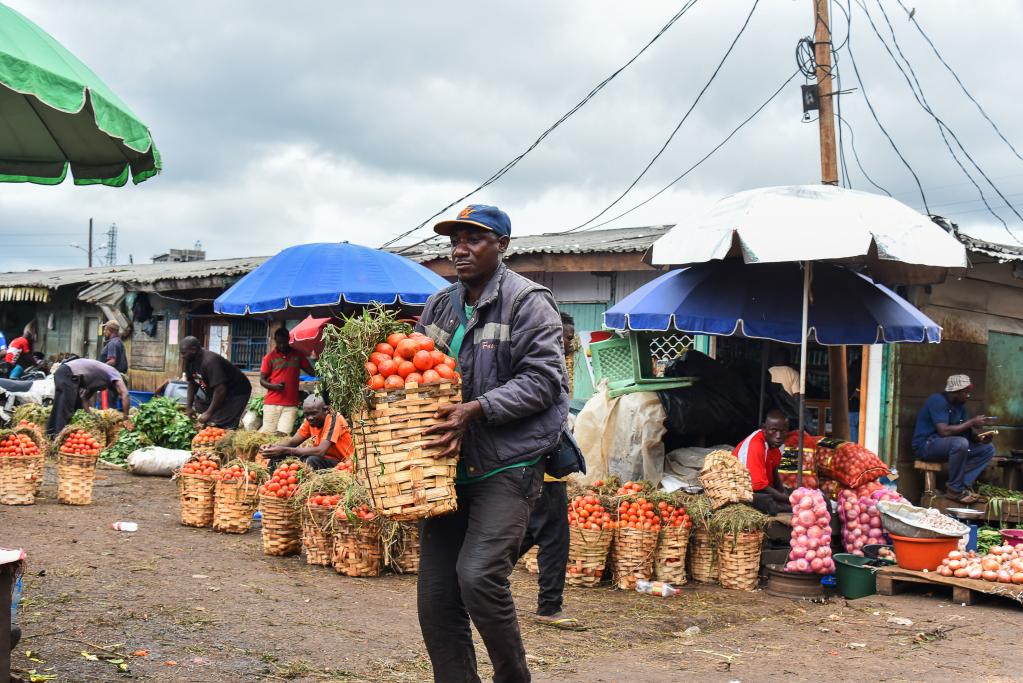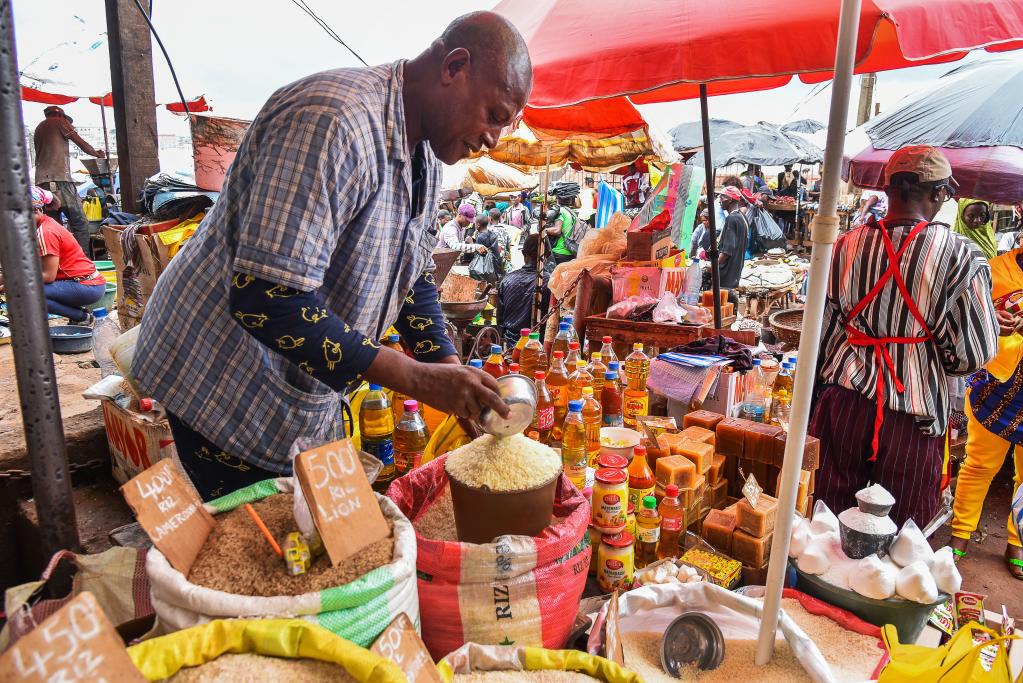
This photo taken on June 21, 2022, shows fish in a fish shop at Mokolo market in Yaounde, Cameroon. (Photo by Kepseu/Xinhua)
Although Cameroon's government plays a great part subsidizing many goods, this has not stopped prices from rising, said Jones Damue, an economist.
YAOUNDE, June 30 (Xinhua) -- Ideline Kuate meandered around Sandaga market in Cameroon's commercial hub of Douala in search of what to buy.
From her job as a farmer, the 40-year-old earns approximately 50,000 xaf (about 80 U.S. dollars) each month but it's no longer enough to adequately feed her family of six.
"(Food) prices were affordable before. With 3,000 xaf, children could feed well. (Now) with 5,000 xaf, you cannot feed the family. We eat what is available, no choice," said Kuate, complaining that a litre of cooking oil she used to buy at 1,200 xaf now sells at 2,100 xaf.
In the capital Yaounde, Marguerite Mbazoa arrived at the Mokolo market to shop but she realized that the fish she used to buy for 1,500 xaf now sells at 2500 xaf.
"Everything has become expensive. Homologated prices are no longer respected," said Mbazoa fuming at how the increase in prices is affecting her children's feeding habits.

A trader carries tomatoes at a food market in Douala, Cameroon, May 23, 2022. (Photo by Kepseu/Xinhua)
When Xinhua visited the once-popular markets in the two cities, few buyers visited the stalls piled high with local commodities, as their soaring prices have discouraged most of the customers from buying.
At his shop at Sandaga market, Francois Tague is selling a bag of rice at 22,500 xaf, the price having doubled in five months.
The 52-year-old said he was contemplating on abandoning his business because there are no buyers.
"It's discouraging, we are just coping," he said.
Prices have continued to rise sharply over the last few months in the Central African nation as the economy, which was barely recovering from COVID-19 disruptions, now suffers from both internal and external shocks.
Official figures put the inflation rate at two percent but purchasing power for an estimated 20 million Cameroonians has dropped considerably over time.
According to Cameroon National Institute of Statistics (NIS), the country is under siege from the rising cost of doing business and the ongoing Russian-Ukrainian conflict which has disrupted the global movement of commodities and pushed up oil prices.
In April, NIS said the prices of food products increased by 10.1 percent and 8.2 percent over one year in Douala and Yaounde respectively. The prices of imported food products increased by 10.1 percent in annual variation, and those of local products by 8.9 percent in Douala, while in Yaounde this increase was 1.3 percent over one month and at 9.2 percent over one year, NIS said.

A trader serves customers at his stall at Mokolo market in Yaounde, Cameroon, June 21, 2022. (Photo by Kepseu/Xinhua)
Among the worst affected commodities are bread and rice, whose high costs has made it a luxury among many Cameroonians, said Josephine Carelle Ngah Misso, who was shopping for her family at the Mokolo market.
"The government has to fix this," she said.
"At first I could sell 10,000 xaf a day, now I cannot even sell 5,500 a day. We are pleading to the government to bring down these prices and increase salaries of civil servants" said Ben Werenge, 60, who trades in food products at the Sandaga market.
Although Cameroon's government plays a great part subsidizing many goods, this has not stopped prices from rising, said economist, Jones Damue.
"The war has disrupted production and trade of several commodities, particularly those where Russia and Ukraine are key exporters, including energy, fertilizers, and grains. These price increases come on top of already tight commodity markets due to a solid demand recovery from the pandemic, as well as numerous pandemic-related supply constraints," Damue said.
The government needs to encourage farmers to grow wheat locally and also subsidize prices of some commodities, he added.
The Ministry of Trade has recently issued a price list of basic commodities following the unauthorized increase in market prices.
The government has tried to reassure Cameroonians in recent weeks that existing wheat reserves and local crops will meet demand for the subsidized bread.
Officials have said subsidy reforms could be included in the 2022/23 budget, though the extent of any reform remains unclear.












